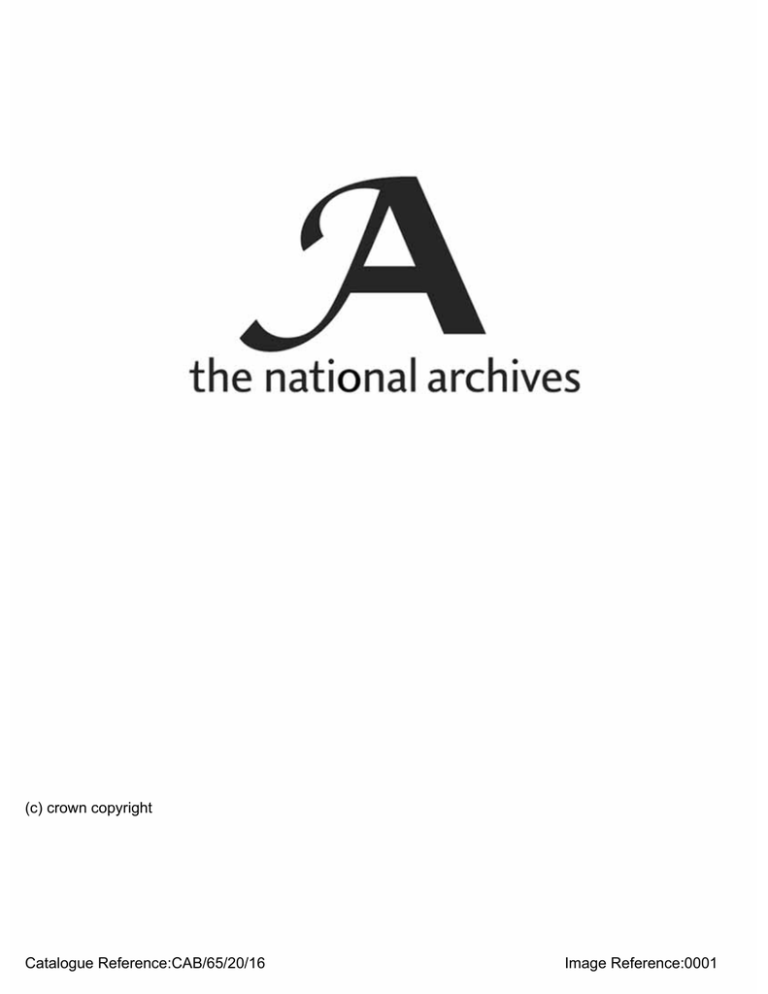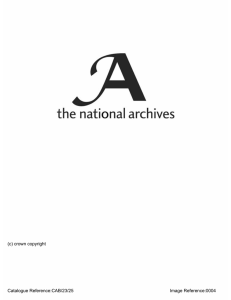(c) crown copyright Catalogue Reference:CAB/65/20/16 Image Reference:0001
advertisement

(c) crown copyright Catalogue Reference:CAB/65/20/16 Image Reference:0001 THIS DOCUMENT IS T H E PROPERTY OF H I S BRITANNIC MAJESTY'S GOVERNMENT Printed for the War Cabinet. December 1941. Copy N o . SECRET. W.M. (41) 123rd Conclusions. TO BE KEPT UNDER LOCK AND KEY. It is requested that special care may be taken to ensure the secrecy of this document. WAR CABINET 123 (41). CONCLUSIONS of a Meeting of the War Cabinet held in the Prime MinistersRoom, House of Commons, S.W. 1, on Wednesday, December 3, 1941, at 12-30P.M. Present: The Right Hon. W I N S T O N S . C H U R C H I L L , M.P., Prime Minister (in the Chair). The Right Hon. C. R. A T T L E E , M.P., The Right Hon. Sir J O H N A N D E R S O N , M.P., Lord President of the Council. Lord Privy Seal. The Right Hon. A N T H O N Y E D E N , M.P., The Right Hon. L O R D B E A V E R B R O O K , Secretary of State for Foreign Minister of Supply. Affairs. The Right Hon. Sir K I N G S L E Y W O O D , The Right Hon. E R N E S T B E V I N , M.P.. Minister of Labour and National M.P., Chancellor of the Exchequer. Service. The following were also present The Right Hon. H E R B E R T M O R R I S O N , The Right Hon. V I S C O U N T C R A N B O R N E , M.P., Secretary of State for the Secretary of State for Dominion Home Department and Minister of Affairs. Home Security. The Right Hon. L. S. A M E R Y , M.P., The Right Hon. L O R D M O Y N E , SecreSecretary of State for India and tary of State for the Colonies (for Secretary of State for Burma. part of Item 2). The Right Hon. A. V . A L E X A N D E R , Captain the Right Hon. H. D. M.P., First Lord of the Admiralty. M A R G E S S O N , M . P . , Secretary of State for War. The Right Hon. Sir A R C H I B A L D The Right Hon. Sir A N D R E W D U N C A N , SINCLAIR, Bt., M.P., Secretary of M . P . , President of the Board of State for A i r . Trade. The Right Hon. B R E N D A N B R A C K E N , The Right Hon. J A M E S S T U A R T , M . P . , Joint Parliamentary Secretary of the M.P., Minister of Information. Treasury. Sir EDWARD BRIDGES, Secretary. CONTENTS. Minute No. Subject. .1 Finland, Hungary and Roumania 2 Man-Power .... .... C o n t r o l of [23221] Industry. Page 202 202 Finland, Hungary and Roumania. 1. A further discussion took place, and is recorded in the Secretary's Standard File of War Cabinet Conclusions. (Previous Reference: W . M . (41) 122nd Conclusions, M i n u t e 6.) Man-power. (Previous Reference: W . M . ( 4 1 ) 1 2 2 n d Conclusions, M i n u t e 10.) C o n t r o l of Industry. 2. The War Cabinet were informed that a section of the Labour Party was putting forward the view that the Governments Man-Power proposals should be matched by further measures for public control over industry and property. Two amendments to the Prime Minister's Motion had been put down on these lines. Many responsible and level-headed members of the Labour Party held that full support for the war effort would not be obtained unless wider measures of control were exercised, and favoured measures to secure public ownership in regard to transport, mines and, perhaps, finance. In support of this view, they cited the criticisms made in the House that many industrial undertakings were being run by the manage­ ments with an eye on the position after the war. In discussion reference was made to the very high rate of taxation. The President of the Board of Trade gave particulars of the control exercised in regard to steel and coal in the present, as compared with the last, war. The present control over coal was far more effective than in the last war. A close survey was now being undertaken in order to determine whether and in what circumstances the policy should be economic development or maximum output in the immediate future. The steel industry was controlled from top to bottom in a way far exceeding anything which had happened in the last war. The control extended to pro­ duction, distribution, price and the conduct of particular under­ takings. An instance was given of a very large undertaking which, although producing steel on a large scale, might have to pass its dividend. As regards transport, the view was advanced that less criticism was now being heard m regard to the operation of the railways than some time previously. The Minister of Labour and National Service suggested, however, that some further measures of control over and above measures which could be enforced through the present system of licensing, might be necessary in regard to the omnibus undertakings. Other instances were cited of the drastic measures in regard to industry and property which the Government had taken where necessary in the public interest, e.g., the scheme for the concentration of industries. Again, the Production Departments did not hesitate to take over the management of firms where they were not satisfied with their efficiency. The view was advanced by The Home Secretary and Minister of Home Security that the Governments position should be that the acid test was whether a particular measure was necessary for the efficient prosecution of the war; and that the Government were prepared to consider on its merits any measure which might be necessary to this end, not-excluding measures of public ownership or control. This view met with general support. It was considered, however, that the balance of advantage lay im treating this matter in such a way as was least likely to arouse further controversy; and that it would suffice if the Lord-President o*f the Council, in the course of his speech that afternoon, made a short statement to the effect that the Government, would take any measure of control over property necessary to help win the war. 203 W.M. 123 ( M ) . The War C a b i n e t Invited the Lord President of the Council to make a state­ ment on these lines, the terms of which should be agreed with the Lord Privy Seal and the Chancellor of the Exchequer, and shown to the Prime Minister. N O T E . — T h e statement made was as follows :— " Winning the war is the sole object. How to do it is the sole test. The Government will not be timid or half­ hearted in taking control of any property or undertaking to whatever extent may be found necessary if by that means a fuller development of the war effort is realised." Great George Street, S.W. 1, December 3, 1941.



